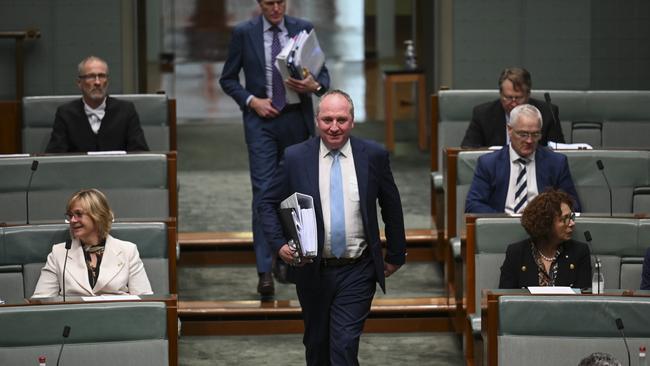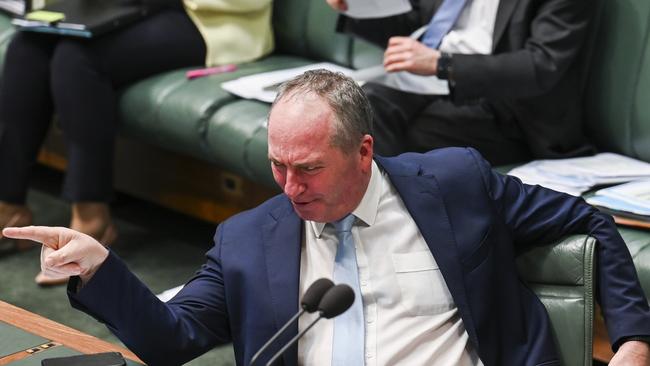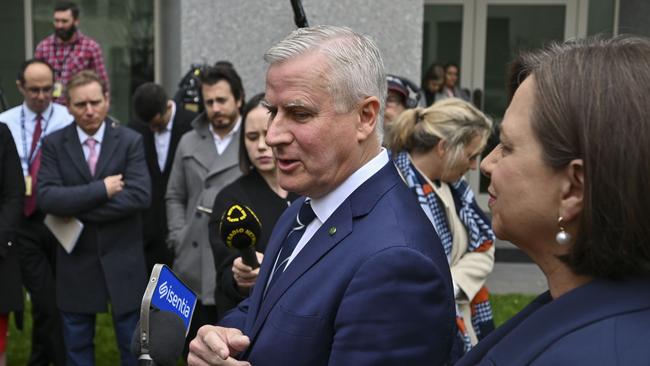Barnaby Joyce turns up the heat on PM
He’s shocked much of the country. Now the revived Nationals leader could hold the government’s fate in his hands.

He returned with a mixture of humility and aggression. “I acknowledge my faults,” Joyce said hours after his victory over Michael McCormack, who had replaced him three years ago. “I’ve spent three years on the backbench and, you know, I hope I come back a better person.”
The Liberals were reeling on Monday at the Nationals’ leadership transition. After recovering from his shock, Scott Morrison called Joyce “a wind in the sails” and said they had “worked together many times” as treasurer and deputy PM. In a week of eruption, Morrison tried to settle the storm.
A mercurial figure who’s always likely to surprise, Joyce’s return as Nationals leader has the potential to make or break the Morrison government – but providing Joyce acts with the pragmatism and common sense he mostly displayed last time as deputy PM, his return can become a net political plus.
Barnaby is always a gamble. His personal life has become a media soap opera. His political persona rests upon a contradiction – he seeks high office yet functions as an outsider. Beloved by regional and rural populists, he has been recalled to solidify the Nationals’ base, invariably at risk, and generate distinction from the Liberals. The danger is obvious – that Joyce strengthens the Nationals but damages the Morrison government. That would constitute a failure.
Joyce’s return has empowered the Nationals. Witness the push this week by Nationals Senate leader Bridget McKenzie, in a move authorised by the party room, to propose amendments in defiance of government policy that would have gutted the Murray-Darling Basin Plan on behalf of Nationals representing the southern regions. It was a doomed quest, repudiated in the chamber by Senate leader Simon Birmingham. But what mattered was not the defeat – it was the fight. The Nationals were standing up. It was gesture politics and product discrimination.
Morrison government policy won’t change but the Nationals have run up their flag. This is politics Barnaby style.
But on the pivotal test of climate change policy – net-zero emissions at 2050 – Joyce was silent after his elevation. This was the wedge he used against McCormack for the past year.
“A net-zero emissions reduction policy would destroy any hope of expanding Australian farming,” Joyce said earlier this year in The Australian, even before you assess the damage to mining and manufacturing.

The test now is whether Joyce deals with Morrison as an ideologue or pragmatist. The Nationals partyroom has not yet debated any net-zero at 2050 proposition. It hasn’t reached a position and, of course, individuals have different positions. The question for the Nationals is whether this issue is transactional – getting the best financial deal – or whether it is deeper, defining and about identity.
Joyce was careful after winning, saying on net zero he “will be guided by my partyroom”. In truth, Joyce and the Nationals confront a moment in history. While Joyce is a born populist, his alter ego is as a pragmatist. Think back to the Malcolm Turnbull era; as deputy PM, Joyce was on the cabinet committee that designed and approved the National Energy Guarantee, which was the trigger for the final move against Turnbull as PM.
Barnaby knows the difference between being a backbencher and deputy PM. Remember, Joyce is a veteran, his career stretches back to the Howard period and this means he grasps something else – the limits of National Party power as distinct from gesture.
Morrison, in veiled language, sent some big political messages this week. He told Neil Breen on 4BC that Barnaby “forms part of the government” and “works alongside me” sitting in the cabinet because “that’s how policies form” and “that’s how decisions are made”.
Decoded: the Nationals are the junior partner.
For Morrison, there will be continuity in policy, not revolutions. The cabinet makes climate policy and the Nationals are a cabinet minority. Morrison could have said more – he won’t retreat at the behest of the Nationals from his “net-zero” campaign in Australia’s national interest; he won’t sign up to any coal-fired power station for political purposes; the government still promotes the transformation of energy policy.
The message has gone out – the Nationals won’t get any extra portfolio jobs. Joyce needs to distribute the existing ministries among his people.
Morrison wants to deal with Joyce pragmatist-to-pragmatist. This is how both are winners. When the Nationals are strong in their base, Liberal-National governments are at their peak. Provided Morrison and Joyce cut a deal on climate change – that means hefty concessions for agriculture and the regions – the combination of Joyce appealing to the regions in NSW and Queensland and Morrison appealing to Liberal supporters across the board will be formidable.
The debate over climate policy was always going to occur. Now it occurs devoid of any leadership issue. Joyce has deposed McCormack, so using net zero as a weapon to smash McCormack no longer arises. Morrison can highlight the common ground the Liberals and Nationals share on climate – a framing of technology, not taxes. Morrison announced last February in relation to the 2050 target: “I will particularly not ask regional Australians to carry that burden.” That’s been on the table for months.

The framing for a Coalition deal was set out this week by Nationals deputy David Littleproud in interview after interview, saying on net zero: “We are pragmatic and open to whatever is good … to put it through the lens of rural and regional Australia … you never say no, particularly in an age where technology is continuing to advance.”
Pressed on net zero, Littleproud said: “No one is running away from that. But we’re just saying let’s go through a process where we can be honest about it … let’s be pragmatic about it and let’s see what can be achieved.”
In his interview with Kieran Gilbert on Sky, Littleproud was even more explicit: “We’re going to see what we can get and make sure that no one’s hurting.” In short, you must sit at the table to get the cheque.
Littleproud is talking price. That’s a transactional deal. It is about who carries the burden. He said farmers have footed the climate change bill for the nation’s social conscience in the past, courtesy of restrictions on land clearing. It won’t happen again. Littleproud’s message is apparent: if Morrison and Josh Frydenberg protect farmers, agriculture and the regions, then a deal on 2050 is possible.
Perhaps. But Littleproud is not the leader. Powerful messages pointing in a different direction were also sent this week by McKenzie and the man who moved the motion against McCormack, former resources minister and Joyce’s confidant Senator Matt Canavan. McKenzie sees net zero at 2050 as a defining moment for Australia’s economy and critical in the century-long story of the National Party, previously the Country Party. “This is a seminal moment for our partyroom,” she said. “Any decision to go to net zero by 2050 is a structural change in Australia’s economy. No one has told us what this means and we need to understand what it means for the communities, the industries and the people who sent us to the parliament.”
Speaking in the Senate, Canavan rubbished the 2050 goal, said Australia was sleepwalking into a mistake, and raised the issue of China’s deception of the world. “There’s been absolutely no detailed economic modelling put before the Australian people about these costs,” Canavan said. He said the New Zealand government did some flawed modelling, concluded its economy would shrink substantially, lose 2 to 4 per cent of its jobs and then chose to exempt agriculture from their target – yet in New Zealand half their emissions come from agriculture.
Canavan attacked net zero as a marketing pitch, saying Australians “hate people with spin” and can see through it. Littleproud reinforced this problem, saying: “Of the 130 countries that have signed up to net zero by 2050, only 14 can give a detailed pathway to getting there. At the moment it’s a platitude.”
Morrison is aware of the credibility chasm: his problem is that the world – politicians, corporates and financial markets – are signing up and will punish outliers. Canavan said that “ultimately the bill will be paid in regional Australia”. Asked by the ABC’s Fran Kelly to predict where the Nationals partyroom would settle on the net-zero debate, Canavan declined to prejudge. But he branded the challenge as “massive”, said the Nationals partyroom “has never supported a net-zero emissions target”, and added that farmers would face bills of tens of thousands of dollars a year while nobody wanted to talk about “who pays for this”.
Everything now comes back to Joyce. He must manage a divided National Party and a demanding Prime Minister. Can he mobilise his authority to assist the Morrison government? That means a historic change – bringing the regional constituency into the net-zero model in a local version of “Nixon goes to China”. Or does Joyce merely fight to turn regional Australia into a river of resistance against net zero at 2050.
There is a further truth. Joyce is far better equipped to sell a “net-zero” deal to his constituency than was McCormack. In reality, McCormack could never market such a deal with Joyce on the backbench branding him a “sellout”. A Nationals leader has two hats – to command his own party and to function as the prime minister’s deputy. McCormack succeeded in the latter and failed in the former.
A prominent National said: “Everyone in the party room likes Michael McCormack but not everyone likes Barnaby Joyce.” This is how power works. McCormack was dignified in smoothing the transition to Joyce. But the situation is precarious. If Joyce overreaches there will be blowback from the Liberals.
Yet huge expectations are vested in Barnaby’s return – he must sort out what he delivers by gesture and what by substance. And he must project empathy. Joyce has a new partner and family but still has a legacy problem with women. His handling of that will be vital. It will feed into a bigger test: did the Nationals get it right or did they bet the house on yesterday’s man?
The Nationals defend the mysteries of their partyroom. It seems, however, that McCormack recontested after the leadership became vacant, a strange move. There was no Joyce/Littleproud contest because Littleproud would not run against McCormack. For Barnaby a win is a win is a win.
Meanwhile, watch the Nationals draw the link between China and net zero. Canavan went in hard: “If you can’t trust China to comply and co-operate with the health inspectors investigating coronavirus, how do you think we can trust them to co-operate with the climate cops that will have to enforce any net-zero emissions deal? Is that real? Are people really thinking the Chinese Communist Party can be trusted when they say they are going to achieve net-zero emissions by 2060? Do you really believe them when last year they installed 38 gigawatts of new coal-fired power stations in China?
“When Xi Jinping goes to Davos, he will say: ‘I have subscribed to net-zero emissions’ and all these bankers who want to make money out of it will lap it up. What a load of rot.”
Joyce has warned about China for years. He doesn’t for a minute believe China’s climate goals. Canavan said Australia must not be beholden to agreements “that betray the interests of the average working men and women … and that is what Barnaby Joyce is focused on.”
Joyce has a lot to focus on. Will he listen to Canavan or will he channel Littleproud and create conditions for Morrison to go to Glasgow with a Coalition compact on net zero by 2050 that would represent an epic political shift?




In defiance of pundits and predictions, he’s back. Barnaby Joyce, the populist from 2018 whose political currency was assumed to have expired, has performed a Lazarus-like resurrection, shocked much of the country, and now holds the future of the Morrison government in his hands.